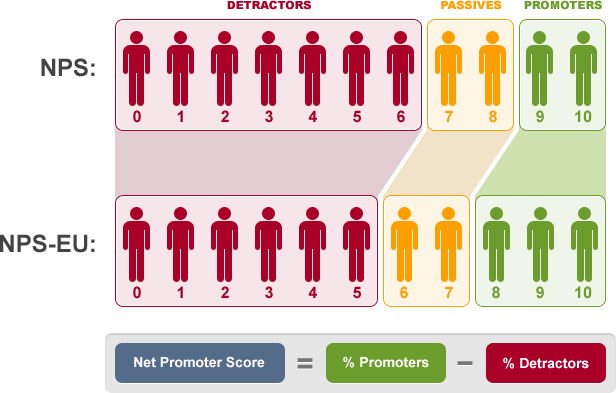The popularity of Net Promoter ScoreSM is staggering. We see it used constantly in both B2C and B2B surveys. Its utter simplicity is extremely attractive to managers sick of the overly complex reports they are used to getting from the market research industry. What I want to talk about is the impact of culture on NPS®. I started thinking about it when a long-time client of ours in the Netherlands was acquired by an American company. The American company placed great importance on NPS even basing bonuses on it. The American company was surprised at what a low NPS score the Dutch Company was getting. The score wasn’t low, it was just above 0 which in NPS terms is actually neutral.
Scoring bias engrained in cultural differences between Europe and US
What was going on here? Well, it had nothing to do with the quality of the service of our Dutch client. It had to do with ‘scoring’ nature of the Dutch respondents versus American respondents. When Americans are asked to rate something on a scale of 0 to 10 they give more extreme responses as compared to their European counterparts. This scoring bias is deeply engrained in the cultural differences between Europe and the US. American children are expected to get all A’s, even in high school. In Europe where tests are graded on a scale of 0 to 10, students can almost never get a ten. A teacher of my daughter once said that an 8 is great, a 9 is for geniuses and 10, well only God can get a 10.
When European respondents, growing up in such a school system, are confronted with a classic NPS scale of 0 to 10, they will – if extremely satisfied – give an 8 (a compliment in their mind). I see plenty of surveys conducted in Europe based on some American template where these respondents are then asked “What can we do to get a 9 or 10?” They inevitably respond with “Nothing, I love your company!” or “Nothing, it was the best service I ever had.”
In classic NPS scoring, the 8 from these respondents has no weight! They are ignored. That is why so many European companies have neutral NPS scores. What I propose is a European Net Promoter Score variant where an 8 also counts as a promoter and 6 as passive.

If I apply this NPS-EU scoring to various client EU companies of ours, I get scores much closer to their respective American industry benchmarks! Using the NPS-EU, would allow American companies to realistically compare their NPS scores with those across the pond. It would also give European managers a more accurate and usable instrument.
A Net Promoter Score variant for each country?
In the future, it could be fine-tuned even further. Once there is enough data from different European countries, a weight or factor could be applied to scores based on the cultural response bias in each country.
What do we do in the meanwhile? Well, our advice to our clients is not to worry about industry NPS benchmarks. Start measuring NPS now yourself and use your score as your own benchmark and base. Then start tracking it through time. Use key-driver analysis to find out which factors affect your score. Take action and repeat. Don’t ask everyone at once. Spread it out and ask a small panel once a month. That way you shorten the cycle between measurement and action and back to measurement again.
What do you think? Let me know in the comments below.
Net Promoter and NPS are registered service marks, and Net Promoter Score and Net Promoter System are service marks, of Bain & Company, Inc., Satmetrix Systems, Inc. and Fred Reichheld.

3 comments
Doe mee aan de conversatieSteven Pelecky - januari, 2014
In my experience, reading, tracking and taking action on the comments your customers take the time to share is most important. Text Analytics is the future. The top level score is secondary. Agree with previous comments about tracking your own performance over time and not getting overly hung up on regional differences in scores.
Marco Schram - januari, 2012
It seems easy to calculate both scores. Further it must be possible to research wether or not promoters show the supposed behavior. Developements go fast, you have to offer communities and incentives if you want people to promote your company or services. You will have to investigate wether new costumers are a result of activity of promotors.
I suspect you will find more cultural differences. The better you are able to adapt to cultural differences the higher will be your succes.
Sarah Mertens - januari, 2012
I am reluctant a change of the NPS method in order to cope with regional differences in scoring perception. If we adapt to a EU NPS, you have to cope with differences within EU: an 8 in Germany means the same as a 9 or a 10 in Italy. and what about countries who prefer a 6-point scale and are less familiar with 10-point scale.
It is not the scale or the formula that is so important, rather the tracking of how the results evolve over time and compared to competitors.